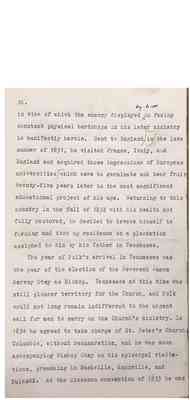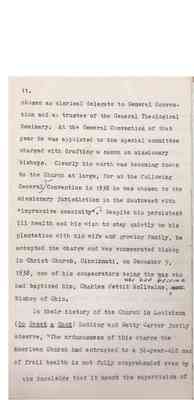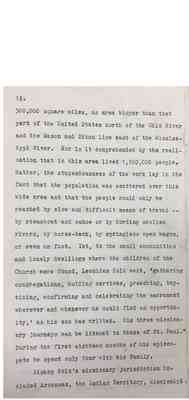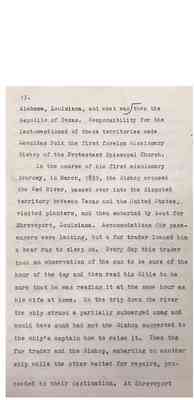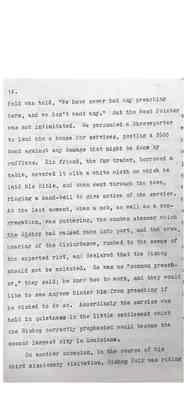Pages
11
-10-
in view of which the energy displayed by him in facing constant physical hardships in his later ministry is manifestly heroic. Sent to England in the late summer of 1831, he visited France, Italy, and England and acquired those impressions of European universities which were to germinate and bear fruit twenty-five years later in the most magnificent educational project of his age. Returning to this country in the fall of 1832 with his health not fully restored, he decided to devote himself to farming and took up residence on a plantation assigned to him by his father in Tennessee.
The year of Polk's arrival in Tennessee was the year of the election of the Reverend James Hervey Otey as Bishop. Tennessee at this time was still pioneer territory for the Church, and Polk could not long remain indifferent to the urgent call for men to carry on the Church's ministry. In 1834 he agreed to take charge of St. Peter's Church, Columbia, without remuneration, and he was soon accompanying Bishop Otey on his episcopal visitations, preaching in Nashville, Knoxville, and Pulaski. At the Diocesan convention of 1835 he was
12
-11-
chosen as clerical delegate to General Convention and as trustee of the General Theological Seminary. At the General Convention of that year he was appointed to the special committee charged with drafting a canon on missionary bishops. Clearly his worth was becoming known to the Church at large, for at the following General Convention in 1838 he was chosen to the missionary jurisdiction in the Southwest with "impressive unanimity". Despite his persistent ill health and his wish to stay quietly on his plantation with his wife and growing family, he accepted the charge and was consecrated bishop in Christ Church, Cincinnati, on December 9, 1838, one of his consecrators being the man who had baptized him, Charles Pettit McIlvaine, who had become Bishop of Ohio.
In their history of the Church in Louisiana (So Great a Good) Hodding and Betty Carter justly observe, "The arduousness of this charge the American Church had entrusted to a 32-year-old man of frail health is not fully comprehended even by the knowledge that it meant the supervision of
13
-12-
500,000 square miles, an area bigger than that part of the United States north of the Ohio River and the Mason and Dixon line east of the Mississippi River. Nor is it comprehended by the realization that in this area lived 1,500,000 people. Rather, the stupendousness of the work lay in the fact that the population as scattered over this wide area and that the people could only be reached by slow and difficult means of travel -- by steamboat and canoe or by fording swollen rivers, by horse-back, by springless open wagon, or even on foot. Yet, to the small communities and lonely dwellings where the children of the Church were found, Leonidas Polk went, 'gathering congregations, holding services, preaching, baptizing, confirming and celebrating the sacrament wherever and whenever he could find an opportunity,' as his son has written. His three missionary journeys can be likened to those of St. Paul." During the first eighteen months of his episcopate he spent only four with his family.
Bishop Polk's missionary jurisdiction included Arkansas, the Indian Territory, Mississippi,
14
-13-
Alabama, Louisiana, and what was then the Republic of Texas. Responsibility for the last-mentioned of these territories made Leonidas Polk the first foreign Missionary Bishop of the Protestant Episcopal Church.
In the course of his first missionary journey, in March, 1839, the Bishop crossed the Red River, passed over into the disputed territory between Texas and the United States, visited pplanters, and then embarked by boat for Shreveport, Louisiana. Accommodations for passengers were lacking, but a fur trader loaned him a bear rug to sleep on. Every day this trader took an observation of the sun to be sure of the hour of the day and then read his Bible to be sure that he was reading it at the same hour as his wife at home. On the trip down the river the ship struck a partially submerged snag and should have had not the Bishop suggested to the ship's captain how to raise it. Then the fur trader and the Bishop, embarking on another ship while the other waited for repairs, proceeded to their destination. At Shreveport
15
-14-
Polk was told, "We have never had any preaching here, and we don't want any." But the West Pointer was not intimidated. He persuaded a Shreveporter to lend him a house for services, posting a $600 bond against any damage that might be done by ruffians. His friends, the fur trader, borrowed a table, covered it with a white cloth on which he laid his Bible, and then went through the town, ringing a hand-bell to give notice of the service. At the last moment, when a mob, as well as a congregation, was gathering, the sunken steamer which the Bishop had raised came into port, and the crew, hearing of the disturbance, rushed to the scene of the expected riot, and declared that the Bishop should not be molested. He was no "common preacher," they said; he knew how to work, and they would like to see anyone hinder him from preaching if he wished to do so. Accordingly the service was held in quietness in the little settlement which the Bishop correctly prophesied would become the second largest city in Louisiana.
On another occasion, in the course of his third missionary visitation, Bishop Polk was riding
